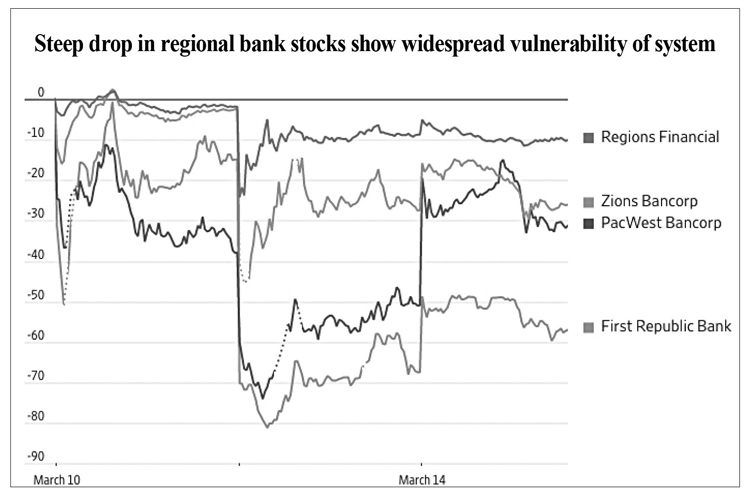Democrats and Republicans are tied up in partisan squabbling over President Joseph Biden’s $6.8 trillion budget plan. While they disagree on Biden’s proposed social expenditures and new taxes to fund them, both parties agree on the need to allocate billions more to Washington’s war machine as the U.S. rulers face challenges from Beijing and Moscow.
At the same time Biden announced his budget, a number of U.S. banks faced a growing crisis, with three bank failures in five days.
Biden knows his proposals have no chance of being backed by the Republicans, who narrowly control the House. His proposals are part of putting together the Democrats’ 2024 presidential and congressional campaigns, and blaming the Republicans for a government shutdown over the debt level if no deal is reached.
Some $842 billion in Biden’s budget is allocated for the Pentagon, a 3.2% increase from last year. A White House press statement says this includes $9.1 billion to expand “U.S. force posture, infrastructure, presence, and readiness” in the Pacific, to counter the rising threat the U.S. rulers face from Beijing. Money is allocated for long-range, undersea and hypersonic missiles. Some $23.8 billion is set aside for what the White House calls “a safe, secure, and effective nuclear stockpile.”
These proposals come as the capitalist rulers in Beijing extended their reach in the Middle East, fostering an agreement between the rulers in Iran and Saudi Arabia. For years Washington has sought to pit the regimes in Saudi Arabia and other Sunni Muslim countries against Tehran and to push them to recognize Israel. The reactionary rulers in Iran threaten to destroy Israel. The Beijing-backed deal is another blow to Washington’s pursuit of its interests in the region.
Most Republicans back more money for the military. “We’re the greatest fighting force in the history of the world,” Biden boasted, ruling out any cuts to Washington’s armed forces or its spy agencies.
“When Biden says ‘we,’ he means the ruling capitalist families he serves,” Lea Sherman, Socialist Workers Party candidate for New Jersey State Assembly, told the Militant. “There is no ‘we’ of working people and capitalists.
“Workers can place no confidence in the bosses’ government, or its budgets. Our stance is, ‘Not one penny, not one person, for the U.S. rulers’ war machine.’”
With an eye on the 2024 election, Biden claimed his budget would help working people in a March 9 speech in Philadelphia. He said he will raise corporate taxes from 21% to 28%, taxes on U.S. companies’ foreign profits from 10.5% to 21% and hike the top tax rate on the wealthy. This will “lift the burden on hard-working Americans,” he claimed.
But the propertied owners easily find ways to evade or undercut any tax hikes, defending their profits and class prerogatives. They fight to shift the burden onto the backs of working people, pushing down wages, cutting their workforce and using speedup to extract more from the labor of those of us left.
“Far from backing the capitalist rulers’ budget, my party says workers need to join together and use our unions to fight for what our class and all those oppressed by capital need,” Sherman said. “We need to build our own party, a labor party based on our unions, to fight against attacks by the bosses and their government. We need to chart a course toward taking political power into our own hands.” Both capitalist parties say they want to lower the government’s deficit, but this is no answer to the problems working people face. However, how they intend to solve that problem — at our expense — does concern us. We already face the scourge of inflation alongside more layoffs. Both the crisis of capitalist production and trade, and the threat of more wars, bears down on workers and our families.
Bank shutdowns
In the midst of today’s economic crisis, three U.S. banks went belly up March 8-12, arousing fears on Wall Street and Washington of deeper problems. Silicon Valley Bank’s plunge was the second-largest bank failure in U.S. history. Silicon Valley was based on servicing tech companies, new startups and venture capitalists. Among the bank’s customers put in jeopardy were streaming device maker Roku and craft internet site Etsy.
The other two banks, Silvergate and Signature banks, had opened their coffers to the crypto industry before the high-profile collapse of FTX and arrest of its founder, Sam Bankman-Fried. Signature’s failure is the third largest in U.S. history.
The value of bonds and other assets at the collapsed banks given as securities by corporate borrowers had dropped as a result of the Federal Reserve raising interest rates. Each bank was hit by a rush of withdrawals, forcing bank executives to sell off securities in their reserves in a doomed attempt to meet these requests.
The capitalist rulers and their government fear an explosion of bank failures. When markets opened March 13, commercial banks fell on the Nasdaq index over 10%, their largest decline since 2008, the Wall Street Journal reports.
The turmoil fed a sharp drop in Treasury bonds, where the yield on two-year Treasury notes has fallen faster than in any three-day stretch since 1987. Investors quoted by the Journal said they hoped this would bring a quick end to further interest rate increases by the Fed.
Biden took to the media to say his administration would use government resources to ensure that none of the big capitalist depositors in those banks would lose money. More broadly his administration offered all corporate depositors at any bank the option to cash in their devalued Treasury bonds at full face value for the rest of the year. Biden claims his promise to give billions to corporate depositors won’t harm working people, but someone will have to pay for his promises.
Assault on jobs and wages
Biden says his administration has created more jobs in two years “than any American president has created in four.” But this is malarkey. Some 3.5 million workers have left the labor force since the pandemic. This February 5.9 million people were officially counted as jobless. And that doesn’t count 5.1 million more workers who would like a job but have given up looking for one. More than 4 million more are forced to work part time because they can’t find full-time work.
Over the past year soaring prices have hit working people hard, especially on necessities of life from food to rent. Many workers have been forced to try to hold down two or three jobs, facing a growing debt burden and challenges in keeping a roof over their heads.
To try and ease the scourge of rising prices, Financial Times columnist Raghuram Rajan says the Federal Reserve must create “some slack in the labor market.” This is a call for pushing unemployment higher, and as a result creating greater competition among workers for jobs as bosses drive to lower wages.
“To prevent layoffs our unions need to fight for a shorter workweek with no cut in weekly take-home pay, to share the work around,” Sherman said. “Escalator clauses are needed in every union contract and in Social Security and other government programs, so that when prices rise our wages go up automatically.”
Acting on the fact that all these political questions are class questions is at the heart of the election campaigns being run by SWP candidates in 2023.


